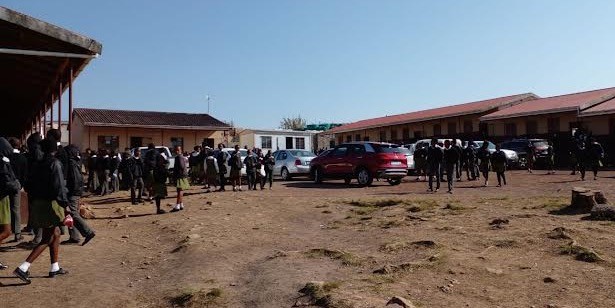Teachers quit Eastern Cape school after accusations of violence against learners
Ngqeleni Junior Secondary School has been short of 14 teachers since March
Ngqeleni Junior Secondary School near Mthatha has been short of 14 teachers since March, after parents protested against two teachers accused of beating their children. Photo: Manqulo Nyakombi
- A protest by parents led to a walkout by teachers from Ngqeleni Junior Secondary School near Mthatha in March.
- The parents were protesting against two teachers they say have been beating learners.
- Twelve other teachers left after the protest and the school has been 14 teachers short since.
- The Eastern Cape Department of Education says no formal complaint was made against the two teachers.
Simmering tension over the assault of learners at school in Ngqeleni village in the Eastern Cape came to a head in March when parents held a protest, demanding that two teachers be fired. Other teachers then left in solidarity, and the school has been short of 14 teachers for four months.
School Governing Body (SGB) member Thabisa Mqoboli says 14 teachers at Ngqeleni Junior Secondary School, near Mthatha, have not been attending classes since 15 March, following a protest by parents. The parents wanted two teachers to be fired, saying they had assaulted learners. Mqoboli said 12 other teachers decided to leave in solidarity with the two teachers.
The school has more than 800 learners from grade one to grade nine and currently has only six teachers, of which two are volunteers asked by parents to assist.
Mqoboli said parents had repeatedly complained to the SGB about beatings of children. The complaint had been taken to the acting school principal, but according to Eastern Cape education department spokesperson Malibongwe Mtima, a formal complaint was never made and no disciplinary inquiry was held.
A learner said two teachers, a man and a woman, had assaulted learners. “Those teachers were not punishing us but fighting. Sometimes they would not even use a hosepipe, they would punch us. In most cases they would beat us for failing their subjects. One of our classmates vomited in class. The male teacher was pressing him towards the wall. He then put his knee in my classmate’s stomach, while beating him with a hosepipe. It was early in the morning. The whole scene happened in front of us. I guess we all decided to tell our parents about that because the next day parents gathered here at the school demanding the two teachers be fired. But we don’t know why other teachers also left,” he said.
The grade 9 learner said he and others had not been able to write second quarter exams in some subjects because there were no teachers. They fear they will have to repeat the year.
Mtima and ward councillor Nomnikelo Yehana (ANC) said teachers claimed that they had been assaulted by parents during the March protest. But parents deny this.
Nontsapho Dluthu, a parent who protested in March, denied that any teachers had been assaulted.
Dluthu blamed the provincial education department for failing to resolve the problem. She said her elder son had dropped out of the school in grade 9, three years ago, because of assaults by teachers at the school.
Mqoboli also denied that teachers had been assaulted during the protest.
She said SGB members had even been to Bhisho to ask the department to intervene to solve the teacher shortage but without success.
“These teachers are getting paid every month but they are not at school. Parents only have a problem with two teachers who were beating learners, not all the teachers. It’s still unclear to us why other teachers decided to leave,” she said.
Yehana also blamed the department for taking too long to resolve the teacher issue. “At our last meeting with the department last month, the department promised to take the teachers to a psychologist, then return them to school. We are still waiting,” she said.
Mtima said towards the end of last year parents had complained about certain teachers and demanded that the department fire them. “This year it got worse until the protest in March.”
Mtima said the department is working on bringing 11 new teachers to the school, and the department would meet the parents soon “to find a way forward”.
Support independent journalism
Donate using Payfast

Don't miss out on the latest news
We respect your privacy, and promise we won't spam you.
Next: Five working days and a decent wage, demand Community Work Programme employees
Previous: Unions bring Makhado municipality to a standstill over “political interference”
© 2023 GroundUp. This article is licensed under a Creative Commons Attribution-NoDerivatives 4.0 International License.
You may republish this article, so long as you credit the authors and GroundUp, and do not change the text. Please include a link back to the original article.
We put an invisible pixel in the article so that we can count traffic to republishers. All analytics tools are solely on our servers. We do not give our logs to any third party. Logs are deleted after two weeks. We do not use any IP address identifying information except to count regional traffic. We are solely interested in counting hits, not tracking users. If you republish, please do not delete the invisible pixel.

